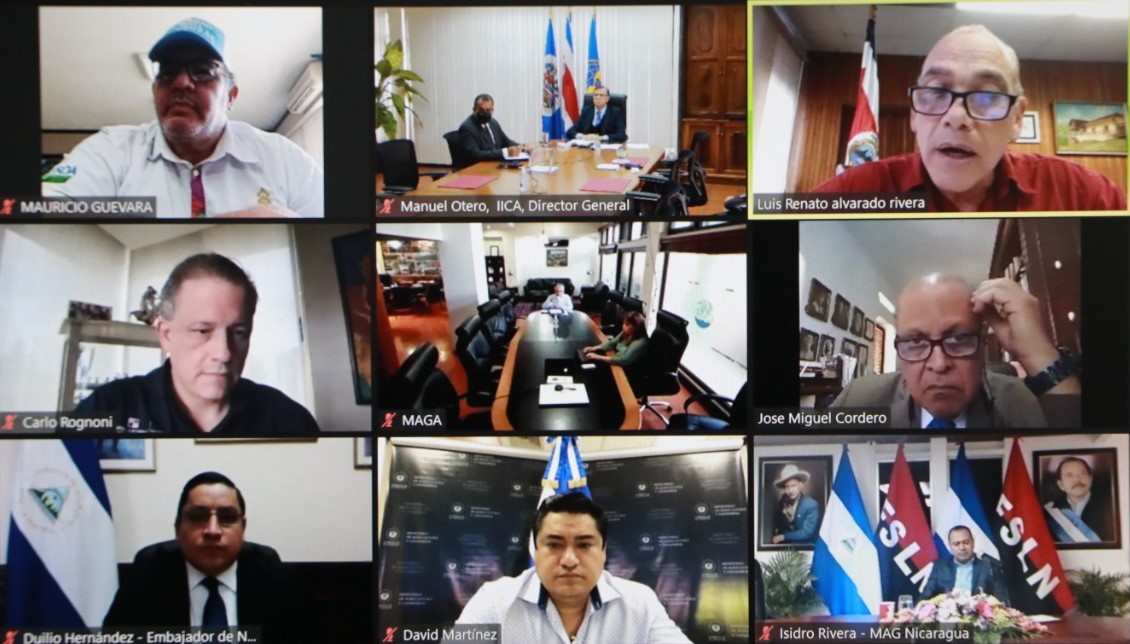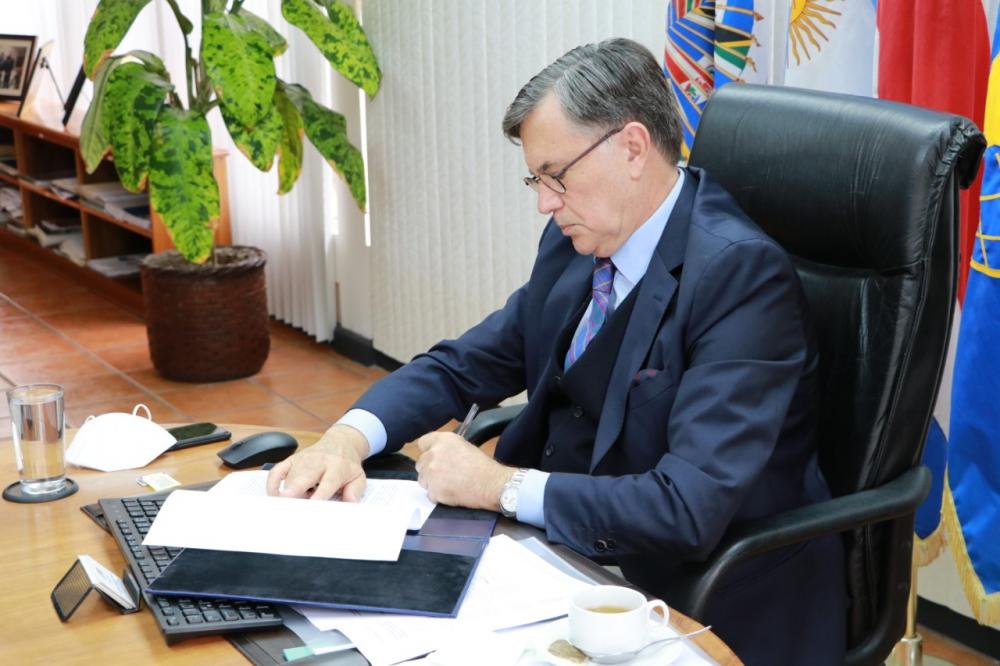According to Manuel Otero, Director General of IICA, the agreement through which IICA supports the Executive Secretariat of the Council will be extended for another four years, which will allow for undertaking larger-scale projects to strengthen Central American agriculture.

San Jose, 15 April 2021. The Central American Agricultural Council (CAC), which is comprised of the ministers and secretaries of Agriculture of the region, and the Inter-American Institute for Cooperation on Agriculture (IICA), renewed their agreement to engage in joint work aimed at fostering the sector’s development in areas such as sustainability, innovation, the incorporation of digital technologies and rural well-being.
During a meeting with the Director General of IICA, Manuel Otero, the ministers and secretaries of Agriculture of Belize, Costa Rica, the Dominican Republic, El Salvador, Guatemala, Honduras, Nicaragua and Panama approved the new agreement, through which the Institute will continue to support the Executive Secretariat of CAC for an additional four years.
The Council is one of the mechanisms of the Central American Integration System (SICA), which is comprised of those countries.
“We thank IICA for all these years of joint efforts and cooperation. The Institute’s contribution is extremely valuable; we have appreciated its solid technical support when required. Us ministers recognize and are grateful for the Institute’s excellent work”, stated Renato Alvarado, Minister of Agriculture and Livestock of Costa Rica.
David Josué Martínez, El Salvador’s new Minister of Agriculture and Livestock, noted that his country plans to modify its production matrix to become less dependent on food imports.
“We have been working on a master plan to facilitate the agriculture sector’s recovery. We thank IICA for its assistance in conducting assessments that will guide our efforts to save agriculture in our country”, remarked the Salvadoran minister.
The virtual meeting of CAC also provided an opportunity to present the progress achieved by the Central American Program for Integrated Coffee Rust Management (PROCAGICA) in countries throughout the region. Implemented by IICA and funded by the European Union, PROCAGICA seeks to improve coffee production and processing, associative marketing among small-scale producers and access to international markets. Participants also discussed the management of the Comprehensive Sustainability Program for the Coffee Chain in Mesoamerica and the Dominican Republic (MESOCAFÉ) and sought to identify partners that could facilitate its implementation.
“Producers in the field have provided us with firsthand information on how coffee is being produced using new technologies and how to increase income generation. In Honduras, for instance, the selling price of coffee berries and pulped coffee has increased by 16%. We congratulate PROCAGICA on its tremendous efforts to improve coffee quality and IICA on maintaining the quality of its certified technical assistance for the benefit of thousands of coffee producers in our country”, remarked Mauricio Guevara, Secretary of Agriculture and Livestock of Honduras.
José Ángel López, Minister of Agriculture, Livestock and Food of Guatemala, stated, “We are on the right track; by improving coffee management, we will be able to retain workers and provide them with better payment”.
In this regard, López requested that the physical and economic mobility of coffee chain workers be included in the cooperation agenda of IICA and CAC, with a view to fostering measures to avoid a possible shortage of workers for this production activity.
A commitment that grows stronger
The Director General of IICA reiterated the Institute’s commitment to CAC and the Central American regional integration mechanisms. “We must continue working together; that is the spirit behind this agreement. We want to ratify our commitment to strengthening agricultural integration in the SICA region, taking into account the multiple challenges that must be addressed within the short and medium term: Covid-19, climate emergencies, adaptation to climate change, strengthening of the region’s agricultural policy and the need to support production chains that have a significant socio-economic impact, such as coffee, cocoa, livestock and basic grains, among others”, explained Manuel Otero.

As part of his support for the regional processes led by SICA, Otero also delivered a message to the Advisory Council for Economic Integration (CCIE), which will meet on April 15, in which he shared IICA’s vision for agriculture in Latin America and the Caribbean, particularly its relationship with global agrifood systems and the upcoming global summit on this topic.
“We will support the ministers and secretaries of Agriculture of the SICA region and the hemisphere by providing countries with all of the technical input they require to give agriculture the place it deserves within food systems”, added the Director General of IICA.
The Food Systems Summit, organized by the United Nations, will be held in September of this year.
More information:
Institutional Communication Division
comunicacion.institucional@iica.int











